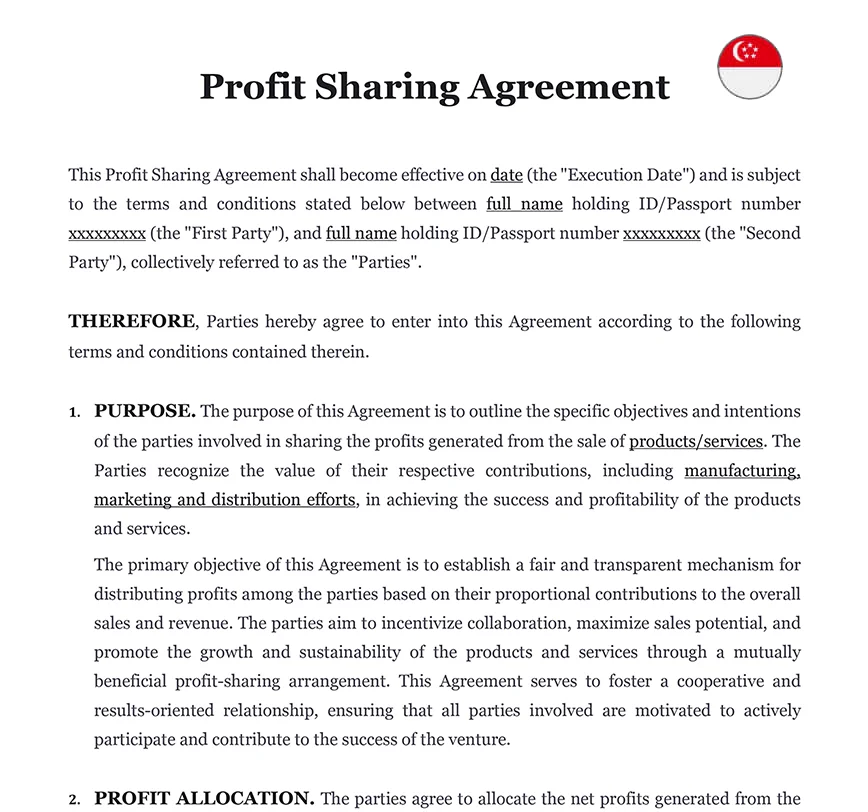Ready to use legal template
Drafted by experienced lawyers
Compliant with Singapore law
Ready to use legal template
Drafted by lawyers
Compliant with Singapore law
Home › Business contract › Profit Sharing Agreement
Learn more about Profit Sharing Agreement in Singapore
Looking to establish a fair and transparent profit sharing arrangement for your business in Singapore? Themis Partner is here to help. Our easy-to-edit legal template for a Profit Sharing Agreement is drafted by experienced lawyers in accordance with Singaporean law. Whether you’re a partnership, joint venture, or any other type of business entity, our template provides a clear framework for distributing profits among stakeholders. It covers important aspects such as profit allocation methods, timing of distributions, and dispute resolution mechanisms. Simplify the process and protect the interests of all parties involved with our professionally drafted Profit Sharing Agreement template.
Table of contents
-
How does a Profit Sharing Agreement work in Singapore?
-
What does Profit Sharing Agreement include?
-
How does it define the distribution and allocation of profits?
-
What factors are considered when determining profit shares?
-
What are the tax implications and obligations?
-
Can it be combined with a Share Purchase Agreement?
-
What provisions are included to address termination or amendment?
How does a Profit Sharing Agreement work in Singapore?
A Profit Sharing Agreement in Singapore is a contractual arrangement between parties that outlines the distribution and allocation of profits generated from a business venture.
| ➤ This agreement sets forth the terms and conditions under which profits will be shared among the participating parties. |
| ➤ It typically defines the percentage or ratio by which profits will be divided, taking into account the contributions, investments, or risks undertaken by each party. |
| ➤ The agreement also clarifies the timing and frequency of profit distributions, ensuring transparency and predictability. |
In Singapore, a Profit Sharing Agreement may be used in various scenarios, such as Partnerships, Joint Ventures, or co-investment arrangements. This agreement helps establish fairness, align financial incentives, and motivate collaboration among the parties involved.
What does Profit Sharing Agreement include?
1. Parties Involved
The agreement identifies the parties involved in the profit sharing arrangement, including their legal names and addresses.
2. Profit Calculation
It outlines the method or formula used to calculate the profits generated by the business venture.
3. Profit Distribution Ratio
The agreement specifies the percentage or ratio by which profits will be allocated among the parties involved. This may be based on capital contributions, investment amounts, or any other agreed-upon criteria.
4. Timing and Frequency
It defines when and how frequently profit distributions will occur, such as monthly, quarterly, or annually.
5. Retained Earnings or Reserves
The agreement may address the allocation of profits for the purpose of reinvestment, creating reserves, or funding future business growth.
6. Adjustments or Bonuses
It may include provisions for adjustments or bonuses based on predefined criteria, such as achieving certain performance targets or milestones.
7. Tax Considerations
The agreement may address the tax implications and obligations associated with profit sharing, including the responsibility for tax payments or any specific tax-related provisions.
8. Record-keeping and Reporting
It establishes requirements for maintaining accurate records of profits and distributions, as well as reporting obligations to ensure transparency and accountability.
9. Dispute Resolution
The agreement may include provisions for resolving disputes related to profit sharing, outlining the mechanism or procedure to address conflicts or disagreements.
10. Termination or Amendment
It specifies the conditions under which the profit sharing arrangement can be terminated or amended, addressing the rights and obligations of the parties in such circumstances.
- Remarks:
It is important for parties involved in a profit sharing arrangement to carefully draft and tailor the agreement to their specific needs, ensuring that all relevant provisions are included and that the agreement complies with Singapore’s legal requirements and regulations.
How does it define the distribution and allocation of profits?
A Profit Sharing Agreement in Singapore plays a crucial role in defining the distribution and allocation of profits among the parties involved in a business venture. This agreement outlines the specific methodology, formula, or criteria by which profits will be distributed. It may establish a fixed percentage or ratio that determines the portion of profits allocated to each party, taking into consideration factors such as capital contributions, investments, or efforts made by each party. The agreement also addresses the timing and frequency of profit distributions, whether they will be made periodically or upon specific milestones or events.
The agreement may include provisions for profit reinvestment or reserves, allowing for the retention of a portion of profits for future growth or unforeseen circumstances. By clearly defining the distribution and allocation of profits, the Profit Sharing Agreement ensures transparency, fairness, and accountability, providing a framework that protects the interests of each party and promotes a harmonious and mutually beneficial business relationship.
What factors are considered when determining profit shares?
1. Capital Contributions: The amount of capital invested by each party in the business venture is often taken into account. Parties who contribute more capital may be entitled to a higher share of the profits.
2. Efforts and Expertise: The level of effort, skills, expertise, and resources brought in by each party can be considered. Parties who actively participate in the venture or provide specialised knowledge may be rewarded with a larger share.
3. Risk and Investment: The degree of risk undertaken by each party and the level of investment made can be factors. Parties assuming higher risks or making significant investments may be entitled to a larger portion of the profits.
4. Time and Involvement: The time and level of involvement dedicated by each party in the venture can be taken into consideration. Parties who commit more time and actively engage in the business operations may be eligible for a larger profit share.
5. Performance and Achievements: The performance and achievements of each party in meeting predetermined goals, milestones, or targets may influence the profit sharing. Parties who contribute significantly to the venture’s success may be rewarded with a higher share of the profits.
What are the tax implications and obligations?
When it comes to a Profit Sharing Agreement in Singapore, there are several tax implications and obligations that the parties involved must be aware of. Profit distributions from the business venture may be subject to taxation, such as Corporate Income Tax or Personal Income Tax, depending on the legal structure and the tax residency status of the parties. The agreement should clearly specify the tax responsibilities and obligations of each party, including the reporting and payment of taxes. It is essential to comply with the relevant tax laws, regulations, and deadlines set by the Inland Revenue Authority of Singapore (IRAS). The parties should also consider any available tax incentives, exemptions, or reliefs that could reduce the overall tax burden.
Can it be combined with a Share Purchase Agreement?
Yes, a Profit Sharing Agreement can be combined with a Share Purchase Agreement in certain situations. A Share Purchase Agreement is a legal contract that governs the purchase and sale of shares in a company. It outlines the terms and conditions of the share transfer, including the purchase price, payment terms, warranties, and representations.
In some cases, a business arrangement may involve both profit sharing and the acquisition of shares. For example, if a party is acquiring a portion of the company’s shares, they may also negotiate a profit sharing arrangement as part of the overall agreement. This allows the acquiring party to benefit from future profits generated by the company.
ℹ️ By combining a Profit Sharing Agreement with a Share Purchase Agreement, the parties can address both the ownership and profit distribution aspects of the business transaction in a single comprehensive document. This ensures that the terms related to share acquisition, profit allocation, and other relevant provisions are clearly defined and mutually agreed upon.
It is crucial to ensure that the combined agreement is carefully drafted, taking into account the specific details and requirements of both the share purchase and profit sharing arrangements.
What provisions are included to address termination or amendment?
Provisions addressing termination or amendment are crucial components of a Profit Sharing Agreement in Singapore. These provisions outline the conditions and procedures under which the agreement can be terminated or modified. They provide clarity and establish a framework for addressing changes in circumstances or unforeseen events.
Termination provisions typically specify the grounds for termination, such as a breach of contract, non-performance, insolvency, or mutual agreement. The agreement may outline the notice period required for termination and the rights and obligations of the parties upon termination, including the distribution of remaining profits or the winding down of the business venture.
Amendment provisions, on the other hand, allow for changes or modifications to the agreement. They specify the process for proposing and approving amendments, including any requirements for written consent or unanimous agreement among the parties. These provisions help ensure that any changes to the profit sharing arrangement are made in a structured and agreed-upon manner.
By including robust termination and amendment provisions in the Profit Sharing Agreement, the parties can effectively address potential contingencies and safeguard their interests.
SPECIAL OFFER
Startup
15 Document Package
Essential documents for running your business in Singapore
Profit Sharing AgreementTemplate (.docx)
Save on attorney fees
310 client reviews (4.8/5) ⭐⭐⭐⭐⭐
Share information
Why Themis Partner ?
Make documents forhundreds of purposes
Hundreds of documents
Instant access to our entire library of documents for Singapore.
24/7 legal support
Free legal advice from our network of qualified lawyers.
Easily customized
Editable Word documents, unlimited revisions and copies.
Legal and Reliable
Documents written by lawyers that you can use with confidence.




